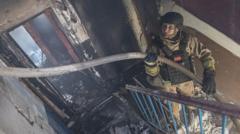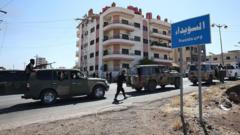In regions of Ukraine currently under Russian occupation, residents navigate a precarious existence. As the conflict grinds on, stories from individuals living in cities like Melitopol, Mariupol, and Crimea uncover the stark realities of life under foreign rule and the courage it takes to resist.
**Silent Defiance: Life Under Russian Occupation in Ukraine**

**Silent Defiance: Life Under Russian Occupation in Ukraine**
Ukrainians in occupied territories face pressure and danger while engaging in subtle acts of resistance against Russian control.
While a fifth of Ukraine's territory remains under Russian control, the daily life of inhabitants is marked by coercion and struggle. Three unnamed individuals, whom we are calling Mavka, Pavlo, and Iryna, share their experiences of living under occupation. Mavka, who stayed in Melitopol during the invasion, laments the forced Russification in her community, including mandatory Russian passports and changes to educational curricula emphasizing military allegiance.
Meanwhile, Pavlo recounts his traumatic experience during the siege of Mariupol, which left the city isolated and heavily impacted by Russia's demands. He illustrates how the requirement for Russian citizenship limits daily activities, creating a climate of intimidation. Emphasizing the burden of retaining property amid rising unemployment and a struggling economy, Pavlo reflects poignant conversations among residents about property rather than hope.
Iryna, residing in Crimea since its annexation in 2014, reveals that Ukrainian culture has been systematically erased. She describes the atmosphere of fear that permeates daily life, from the mandatory singing of the Russian anthem in schools to the dangers of speaking Ukrainian in public spaces. Small gestures of cultural remembrance, like dressing in traditional attire, risk severe reprisals.
Despite these challenges, forms of resistance endure. Mavka speaks of a clandestine group, Zla Mavka, dedicated to asserting a Ukrainian identity, with activities ranging from disseminating pro-Ukrainian materials to engaging in unconventional protests against occupiers. In contrast, while Pavlo is preoccupied with the urgency of finding peace, he grapples with the implications such a resolution might entail for those who have made sacrifices in this ongoing conflict.
Ultimately, as the war lingers on, the fate of Ukraine’s occupied territories hangs in a fragile balance. The struggle for identity and the fight against oppression continue to define the resilience of these local populations, who remain hopeful for a future free from occupation.
**In summary, while the daily lives of Ukrainians under Russian control are filled with fear and challenges, their acts of silent resistance demonstrate an enduring commitment to their national identity and hope for eventual liberation.**
Meanwhile, Pavlo recounts his traumatic experience during the siege of Mariupol, which left the city isolated and heavily impacted by Russia's demands. He illustrates how the requirement for Russian citizenship limits daily activities, creating a climate of intimidation. Emphasizing the burden of retaining property amid rising unemployment and a struggling economy, Pavlo reflects poignant conversations among residents about property rather than hope.
Iryna, residing in Crimea since its annexation in 2014, reveals that Ukrainian culture has been systematically erased. She describes the atmosphere of fear that permeates daily life, from the mandatory singing of the Russian anthem in schools to the dangers of speaking Ukrainian in public spaces. Small gestures of cultural remembrance, like dressing in traditional attire, risk severe reprisals.
Despite these challenges, forms of resistance endure. Mavka speaks of a clandestine group, Zla Mavka, dedicated to asserting a Ukrainian identity, with activities ranging from disseminating pro-Ukrainian materials to engaging in unconventional protests against occupiers. In contrast, while Pavlo is preoccupied with the urgency of finding peace, he grapples with the implications such a resolution might entail for those who have made sacrifices in this ongoing conflict.
Ultimately, as the war lingers on, the fate of Ukraine’s occupied territories hangs in a fragile balance. The struggle for identity and the fight against oppression continue to define the resilience of these local populations, who remain hopeful for a future free from occupation.
**In summary, while the daily lives of Ukrainians under Russian control are filled with fear and challenges, their acts of silent resistance demonstrate an enduring commitment to their national identity and hope for eventual liberation.**





















